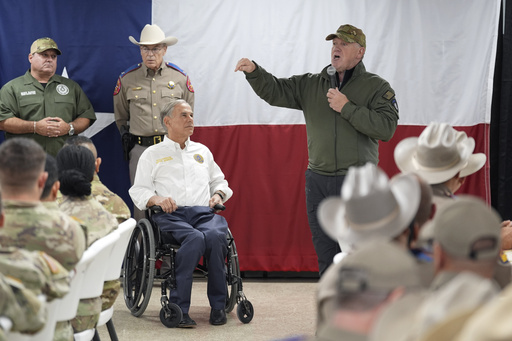In Jefferson City, Missouri, as the newly elected President Donald Trump begins to form his administration, several Republican state governors and legislators are introducing initiatives that could support his commitment to deport millions of undocumented immigrants living in the United States.
An increasing number of lawmakers are advocating for legislation that would grant local police the authority to arrest individuals who have entered the U.S. illegally. This follows similar laws initiated in Texas and other states, which are currently on hold pending judicial review regarding their potential overreach of federal authority.
Additional proposed legislation would mandate that local law enforcement agencies notify U.S. Immigration and Customs Enforcement (ICE) whenever they detain someone who is in the country illegally, irrespective of the nature of the charges. While these proposals haven’t been specifically requested by Trump, many align with his broader immigration policy goals.
Missouri state Sen. Curtis Trent, who is backing one such proposal, expressed that the initiative would assist in identifying and removing people in violation of immigration laws in a systematic manner. According to estimates from the U.S. Department of Homeland Security, around 11 million unauthorized immigrants resided in the U.S. as of 2022. During his campaign, Trump advocated for creating “the largest mass deportation program in history” and suggested utilizing the National Guard and local law enforcement to support this effort.
In contrast to these proposals, some states led by Democrats are actively resisting potential Trump policies. For instance, California’s legislature has commenced a special session aimed at protecting immigrants by enhancing access to legal support for those facing deportation.
According to Tim Storey, CEO of the National Conference of State Legislatures, it’s likely that lawmakers across various states will adopt either cooperative or obstructive strategies in response to Trump’s immigration plans.
In Missouri, the legislation proposed by Trent would establish a new state offense for “improper entry by an alien,” potentially resulting in penalties of up to $100,000 or mandated deportation. Additionally, another initiative from state Sen.-elect David Gregory plans to create a similar state crime with a $1,000 reward for informants who report undocumented individuals, permitting private bounty hunters to assist in apprehending them.
Gregory emphasized the importance of taking action, as certain jurisdictions are reluctant to collaborate with federal immigration authorities. Missouri’s Republican Governor-elect Mike Kehoe has not publicly endorsed any specific legislative proposal. However, he has expressed support for more stringent measures against individuals here illegally.
Concerns have already been raised by immigrant advocacy organizations regarding the implications of these proposals. Ashley DeAzevedo, president of American Families United, has criticized the bounty approach for potentially inciting disorder and division.
Public opinion appears mixed; while there is still considerable support for pathways to citizenship for undocumented residents, a growing number of voters favor deportation. Recent polling data indicates that more than 40% of voters now believe that most immigrants living in the country illegally should be returned to their home countries, an increase from 30% in 2020. Concurrently, support for offering a chance at legal status has diminished from about 70% to just over 50%.
Texas is often cited as a prime example for stringent immigration enforcement, with its Operation Lone Star initiative reportedly costing $11 billion. The state has implemented multiple security measures along the border and has facilitated the transport of many migrants to cities like New York and Chicago. This operation has led to tens of thousands of arrests, including for minor infractions like trespassing.
Tom Homan, previously designated as Trump’s “border czar,” noted Texas’ border policies as a potential model for the incoming administration, confirming ongoing discussions between Texas officials and Trump’s team regarding enforcement strategies.
Following Texas’ precedent, legislatures in other states such as Iowa, Louisiana, and Oklahoma have passed similar laws allowing local law enforcement to detain undocumented individuals. Oklahoma’s efforts are particularly focused on deporting undocumented immigrants currently in state prisons.
Arizona voters have also recently approved a measure empowering local law enforcement to arrest individuals suspected of illegal entry from Mexico, contingent upon similar enforceable laws in other states.
Besides these measures, other Republican-led initiatives aim to strengthen local-federal collaboration in immigration enforcement. For instance, Utah Governor Spencer Cox has initiated efforts to improve coordination with federal authorities to identify and deport undocumented individuals within the state’s justice system, emphasizing a zero-tolerance approach to those who pose a threat to public safety.
Meanwhile, Georgia enacted a law requiring jailers to check inmates’ immigration status and assist federal authorities in enforcement efforts, inspired by a high-profile murder case involving a Venezuelan man in the U.S. illegally.
North Carolina’s Republican-led legislature recently overrode Democratic Governor Roy Cooper’s veto, enforcing compliance among sheriffs with federal immigration requests, especially after pushback from several Democratic sheriffs in urban areas who were resistant to cooperating with ICE.
On the other hand, some Democratic leaders are cautioning against sweeping deportation tactics. Kansas Governor Laura Kelly acknowledged the need for deportation for individuals committing crimes while undocumented but opposed using the National Guard for enforcement. Wisconsin Governor Tony Evers, facing a Republican legislature, defended the importance of undocumented workers in essential sectors, calling efforts to deport them irrational.




